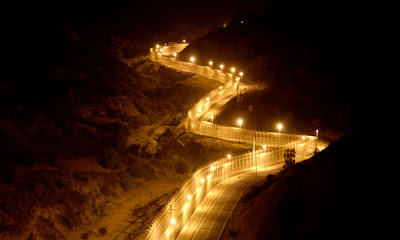First released theatrically in March of 2011 (in its home country of Austria) but filmed across Europe between October 2008 and November 2010, ABENDLAND, the latest documentary from Nikolaus Geyrhalter, holds a camera up to the then present-day Europe, filmed only at night and in beautifully compo-sed shots, to reveal a continent trying to hold on to its humanity, some-times in very odd ways. Since then, things have only grown worse.
Herr Geyrhalter, shown at left, who earlier gave us Our Daily Bread, is back again in a similar style: all visual, no narration, with occa-sional unrehearsed conversations recor-ded but barely heard. This makes us pay far greater attention than we would need to, were everything doled out to us on a platter and made easily digestible. Instead we piece together what's going on and why, and how this all fits into Geyrhalter's vision (the filmmaker both directed and handled the cinematography), which in time becomes our own vision. Not that Nikolaus forces his viewpoint upon us, but as the movie proceeds we cannot help but see and understand things as does this unusually gifted and thoughtful cinematician.
Now we're in a pristine hospital, watching a woman and her newborn -- perhaps premature, for we we next see a nurse tending to a tiny incubated infant. And then we're at a meeting of a sub-commission of the European Parliament (below), listening (or reading subtitles) as the chairman explains that Bosnia and Herzegovina are still not satisfied with their situation. (Well, who of us is, but still...) In this scene a number of languages come together. We're then whisked off to a chicken cooking facility (shades of Our Daily Bread) and an enormous sort of Beer Garden (above) where huge crowds have gathered to eat, drink and party. This sort of thing resembles hell on earth to me, but the party-goers appear to be having fun.
Then it's back to security cameras, this time outside a Barclay's Bank in London (the name of which should resonate now, as the current LIBOR scandal unravels, much more than when the film was shot: Those cameras tell us the date was July 28, 2009). After which, we're with a group of men working the late shift in an aircraft factory. Here, the colors and composition are gorgeous (the composition often is throughout the film, but the colors are unusually bright). And who is that? Looks like some high-level religious figure -- ooops, it's the Pope! -- who is being celebrated and asked by the crowd an important question. His "answer" is bullshit, because it does not actually answer the question; the Lord's Prayer is intoned; and then, as all is clearly A-OK, security takes His Holiness away.
We next get a newscast from Britain: The usual: from terrible deaths in Pakistan to the Burberry raincoat company, trying to make a couture comeback. Both stories are given equal weight, of course. This is the news. We watch, as postal workers sort mail using the spoken word to differentiate -- this is fun and odd -- and then we follow a fellow at work at his home computer. We're made privy to a suicide hotline (or maybe it's simply some very good telephone therapy); the police come to find a man's brother, who is evidently "wanted"; we visit a porno site with a man and woman first fucking, then chatting and showering (Are they a couple? Perhaps, and if so, this is an interesting, calorie-burning way to earn one's living.)
Cut to some hospital maintenance, washing a patent, changing his or her sleeping position, and tending to the general needs. Now it's police vs demonstrators against... what? Toxic waste, perhaps. Immigration raises its head in a meeting between a needy illegal and a kindly but distant volunteer. The airport is shown during midnight maintenance, as scrubbing continues on everything from mirrors to toilets. Oh-oh: it's a crematorium, super-clean and spacious (shown in photo at bottom), as one body after another is reduced to ash and bone. Immigration again, as authorities check the sea wall (below) for any breech. Finally, a rock concert and a sea of bodies (mostly young) and lights.
The above description may sound awfully dry, and yet this movie is anything but. It's dark twice over: the entire film takes place in nighttime after all, but it also leaves you with a feeling of a Europe problemed in ways that do not make for easy solutions. What is the filmmaker saying? Nothing terribly simple nor obvious, I suspect. Repeated screenings might give up more meaning, but on a first viewing, the film is nearly hypnotic. It's hard to pull yourself away from it. Geyrhalter and Widerhofer are artists first, propagandists second (if at all). And they are very humane. Even at the rather large distance they keep you -- by virtue of no narration, little verbiage from any of the people you see, and no sense of taking sides with or against anyone -- you'll still come away from this movie with both a sense of sadness and of hope for humanity.











No comments:
Post a Comment